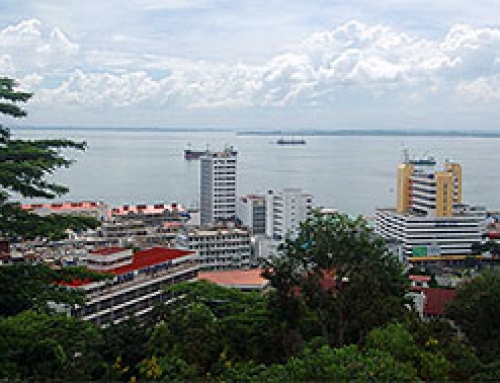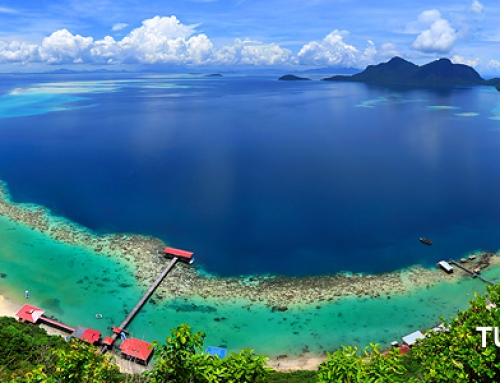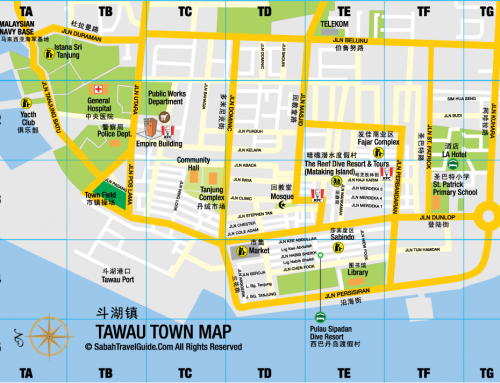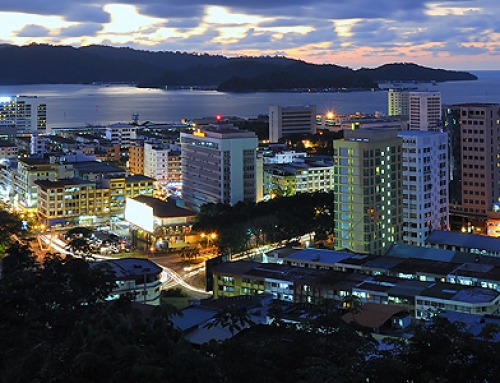LABUAN, THE INTERNATIONAL ISLAND GARDEN OF BORNEO is a popular retreat for corporate Asia to relax and recuperate. This is a place where the old and the new complement each other, where traditional ways and hi-tech methods co-exist, where people of diverse backgrounds live in perfect harmony.
Labuan has everything one would expect of a tropical island. Surrounding coral reefs provide a glimpse into the fascinating and delicate marine eco-system. Secluded beaches on nearby islands offer quiet solitude. Shipwrecks promise the thrill of danger for expert divers. Lovers of sea sports can enjoy an increasingly wide range of water sports and recreation. As a duty free port, Labuan is a haven for branded imports. Local customs and traditions, monuments and memorial parks, reflect the rich history of this island.
From world-class resorts and five star hotels to broadband telecommunications, Labuan is well equipped to serve as a venue for corporate meetings, incentives, conventions, and exhibitions. Its success as a progressive International Offshore Financial Center in Asia further boosted the island’s appeal among the world’s rich and famous.
As a duty-free island, Labuan enjoys many special privileges and facilities. Besides great bargain shopping, the island offers plenty of business and investment opportunities. It has a similar status to the other free trade zones in Malaysia. They allow raw materials and components used in manufacturing to be brought in and exported free of duty and taxes. Such easing of custom control allows many profitable entre-port activities to be conducted freely in Labuan. Shipbuilding, ship repair, oil and gas are among the main industrial activities. Other fast-growing sectors include banking and finance, tourism and education.
The name Labuan derives from the Malay word labuhan meaning harbour. During World War II, the Japanese called it Maeda, taken after their first commander of Japanese forces in northern Borneo Labuan. The island was historically one of the important surrender points.
Labuan serves as a hub for visitors landing via ferry from Brunei en route to Jesselton Point.
LABUAN EARLY HISTORY
The British came to Labuan one hundred and fifty years ago. It was a strategic re-fuelling station for British steamships of the day. The island was ceded to the British by the Brunei Sultanate in 1840 and was subsequently established as a free port. The British ruled the island for the next one hundred and seventeen years until Labuan joined Malaysia in 1963.
Labuan was a British naval base to fight the pirates in the Brunei Bay. Some old graves bearing the names of young British officers who died fighting the pirates can still be seen today at the Botanical garden.
The only industry on the island then was coal mining. Five British companies consecutively mined the coal for 64 years. A railway line was built to transport coal from Tanjong Kubong coal mine to Victoria Port. Labuan was the only significant coal mining centre of the then British Empire in the Far East in 1847. The 106 feet high Chimney and the tunnels are remnants of the coal mining days.
The main town of the island was named Victoria, after Queen Victoria.
During the Japanese administration in 1942, the island was re-named Maida Island in memory of General Maida, the Chief Commander of the Japanese forces in Borneo who was later killed in an air crash from Bintulu to Labuan. The Japanese ruled the island for almost three years from 1942 to 1945. The liberation of Borneo by the Allied Forces started in Labuan on 10th June 1945. The Australian forces landed in Labuan under the command of General McArthur. The island was reverted back to British rule until 1963.

WWII MEMORIAL (LABUAN WAR CENTER)
Situated at Jalan Tanjung Batu, about 3,905 graves of soldiers mostly Australians and British lie here. A memorial service is held on the nearest Sunday to 11 th of November. This memorial is maintained by the Commonwealth War Graves Commission.

LABUAN BIRDS PARK
Located near the Tanjung Kubong Tunnel. This Birds Park shows a large variety of tropical birds from around the region such as hornbills, kingfishers, sharmas, mynas, herons and maybe even ostriches and peacocks.

THE CHIMNEY
The chimney has often been said to be the ventilation shaft for the underground tunnels. Some had even suggested smoke has passed through it but lately, excavation works around the immediate area has literally uncovered a mystery – beneath the base of the shaft are no tunnels to be found! So if it is really was supposed to be a ventilation shaft, why are there no tunnels? Furthermore, the diggings have revealed that the chimney is built on a base of white kaolin clay. It also has a foundation of twelve layers of bricks on which it sits, and there is no evidence of soot at all inside the chimney walls.

LABUAN SQUARE (DATARAN MERDEKA)
The heart of Bandar Labuan, formally known as Victoria town. Flags of all the Malaysian states flutter beside the town Padang. Nearby are the four historical “flame of the forest” trees. Many stone plaques recall the historical events of Labuan throughout the years.

LABUAN JAPANESE SURRENDER POINT
Located at Layang-Layangan, this is where the 37th Japanese Southern Army surrendered to the 9th Division Australian Imperial Forces on 9th September 1945 which led to the end of WWII in Borneo. It is also in this area that South East Asia’s first war crime trials were conducted.

LABUAN MARINE PARK
The three islands of Rusukan Kecil, Rusukan Besar, and Kuraman make up this Park. Its wide sandy beaches are perfect for picnic and surf bathing. As it is close to the wreck-dive sites, many divers use it as their base. Rusukan Besar still has dense forest but is nice for picnicking, swimming and snorkelling. Rusukan Kecil in its unspoiled state is suitable for camping. An atoll in the middle of the marine park has many snakes sheltering there.
WHERE IS IT?

ATTRACTION POINTS


Founded in 1996, Reef Check is the world’s largest international coral reef monitoring programme involving volunteer recreational divers and marine scientists






